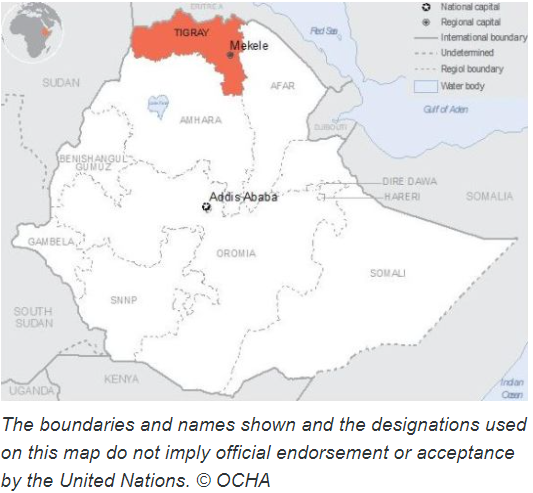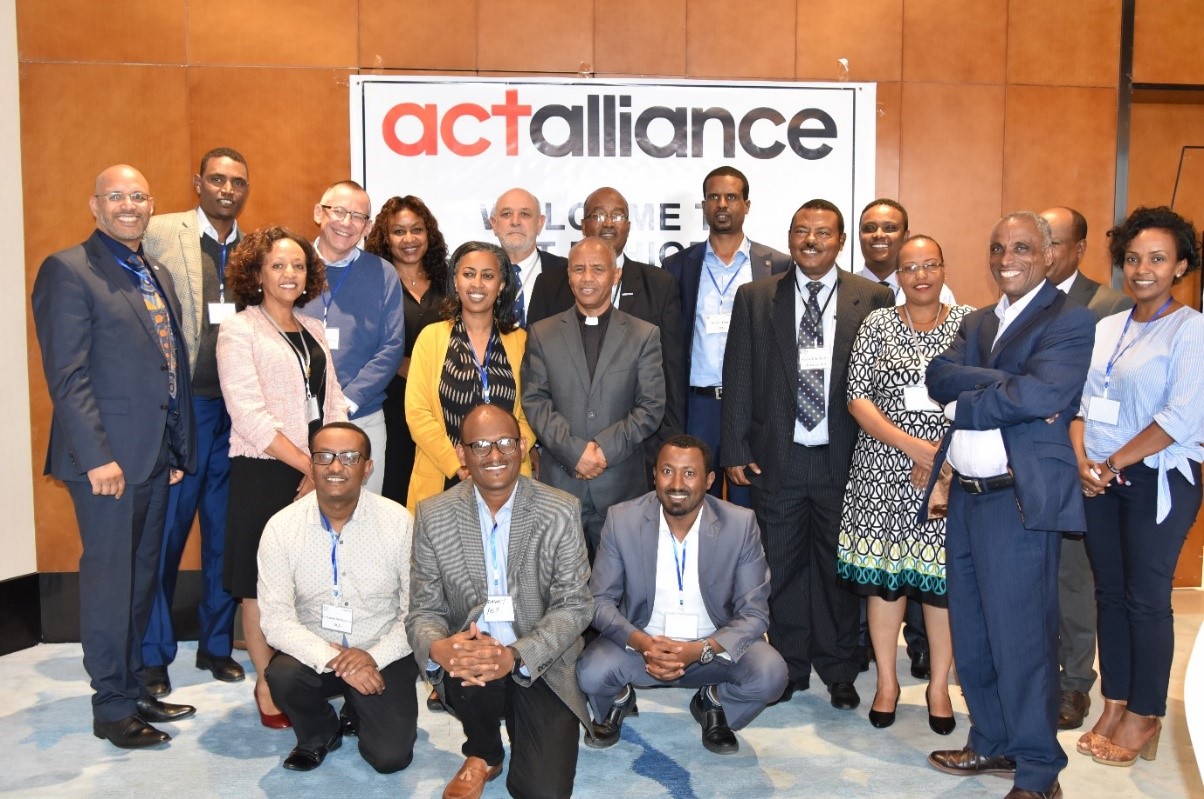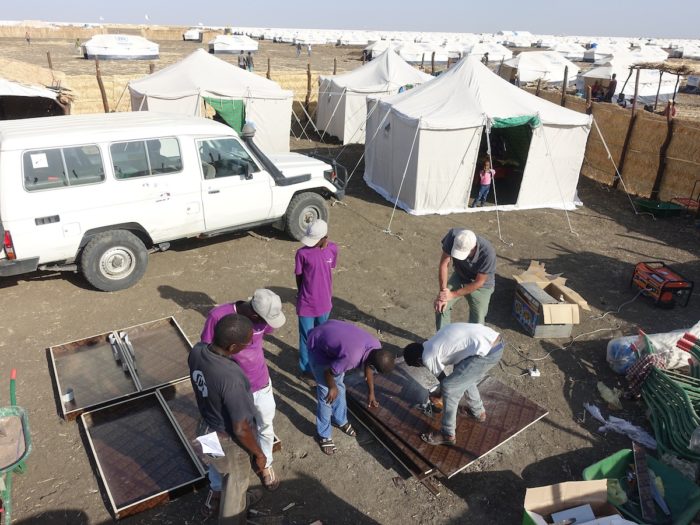On 4th November 2020, hostilities broke out again between the Ethiopia Federal government and the northern regional state of Tigray. Military action resulted in general insecurity, internal and external displacements, and a disruption of livelihoods in the region. At least 1.3 million persons are currently in need of humanitarian assistance, including residents, internally displaced persons, returnees, and over 96,000 Eritrean refugees. ACT Alliance launched a joint appeal on 23rd December 2020 for the response in Ethiopia. ACT-member Lutheran World Federation gave an update on the highly difficult situation in February 2021.

Source: Situation Report – Ethiopia – Tigray Region Humanitarian Update – 28 Feb 2021.pdf (reliefweb.int)
Roles of Ethiopian implementing members
The ACT Ethiopia Forum from the beginning stood in solidarity with the people affected. It called for a peaceful resolution and an immediate stop to the fighting as well as for the establishment of a humanitarian corridor to allow relief operations and the protection of all civilians and humanitarian aid workers.
To achieve the desired outcomes of the Ethiopian response, two of the meanwhile four implementing ACT members (Ethiopia Evangelical Church of Mekane Yesus Development and Social Services Commission (EECMY – DASSC), Ethiopia Orthodox Church Development and Inter-Church Aid Commission (EOC-DICAC), and Lutheran World Federation Ethiopia (LWF-ETH)) are working in close cooperation with the refugee and host communities as well as with the targeted population at all levels. After the recent revision of the appeal ETH201, Norwegian Church Aid (NCA) is planning to work through these national forum members as soon as possible. The existing structures (Refugee Council Committees (RCCs), Women’s Association, Youth Association, elders, and religious leaders) were consulted during project planning as their active involvement is paramount in realizing the projects’ goal and objectives during the project implementation.
Coordination and collaboration required
The third implementing member LWF is a direct implementer. The organization has been active in the Amhara region between Addis Ababa and Tigray for years and its regional coordination office (RCO) in Lalibela is equipped with the required staffing and resources to provide overall management and administrative support to the project. LWF coordinates all the activities closely with the government and other humanitarian actors as well as with various clusters at regional and national levels.
Additionally, for peaceful co-existence interventions, the Ethiopia Inter-Religious Council is engaged. After the withdrawal, it will continue to conduct peacebuilding programs at the local level with existing faith communities.

ACT Ethiopia Forum 2019
Committing the forum fee for the Tigray response
In January 2021, the ACT Ethiopia Forum’s eleven national and international ACT-members decided to contribute their annual fees to the Tigray appeal. We asked the Forum Convenor Christoph Schneider-Yattara (PADD-Bread for the World) and the Forum Coordinator Dawit Beza about the background of this decision.
Christoph and Dawit, who had the idea to contribute the Ehtiopia Forum’s annual fees 2021 to the Tigray appeal?
The Convener brought this to the forum leadership team. We proposed it at the January monthly Forum meeting, and the members accepted it unanimously. In addition, we also re-designated a consultancy fee received from Act for Peace (AfP), Australia, to the appeal. We had received it for a monitoring and evaluation activity carried out on their behalf. AfP consented with our suggestion.
Why did you think it was important to commit the forum fees to the appeal?
It is to be recalled that the forum in November 2020 had issued a statement regarding the Tigray crisis which called members to mobilize resources – programmatic, financial, in-kind, and spiritual – to provide an appropriate humanitarian response as soon as access is secured. Committing the forum fees to the appeal can be considered a follow of action to the forum statement. We are grateful for the funding commitment so far from ACT members all over the world but looking at the dire situation in Tigray, our contribution is like a drop in the ocean.
The forum members authorized the forum leadership together with the implementing partners to designate all un-earmarked funds. You decided to evenly (50-50) split all those funds between DASSC and DICAC. What is the background of this decision?
All undesignated funds will be split between DASSC and DICAC until they reach the funding level received by LWF, then we will reassess.
What are the most urgent needs of people in Tigray?
Food, water, medical supplies are the most urgent needs at this moment. The requesting forum members are now closely working with the regional interim government finance and economic development bureau. The bureau has already signed an agreement and granted go ahead, and the actual implementation such as beneficiary targeting has already been started.
How does the COVID-pandemic affect the situation?
While the COVID-19 pandemic poses a threat to millions of Ethiopians’ immediate health and socioeconomic well-being, the impact deepens for those already in need of humanitarian assistance, especially displaced persons. IDPs, who have been forced to flee their homes to due conflict and disaster, are at higher risk to suffer from immediate and longer-term health effects of the COVID-19 pandemic due to a series of factors, including poor nutrition, insufficient water, overcrowded living conditions, fragmented social networks, and overstretched coping mechanisms. There is a looming disaster to happen in Tigray. No one except those arriving from Addis is wearing masks at all. People said that before the conflict this was very much in force but now, there is total complacency.
What does the Tigray conflict mean to you personally?
Every war is a human tragedy as it not only destroys lives but the social fabric of society. It will take decades to heal and overcome.

Additional ACT responses
Meanwhile, the ACT Sudan Forum has ramped up efforts to support the tens of thousands of refugees fleeing the conflict in Tigray, launching an appeal targeting vulnerable refugees in the Tunaydbah camp.
In other parts of the world, ACT members are engaging in advocacy with their own governments. ACT members in Canada came together and wrote a letter to the Canadian Foreign Minister calling for “unhindered, immediate, sustained and full access to the entire Tigray region for the delivery of humanitarian aid to all civilians affected by the fighting in the region, including Eritrean refugees”, as well as a cessation of hostilities and withdrawal of troops.
